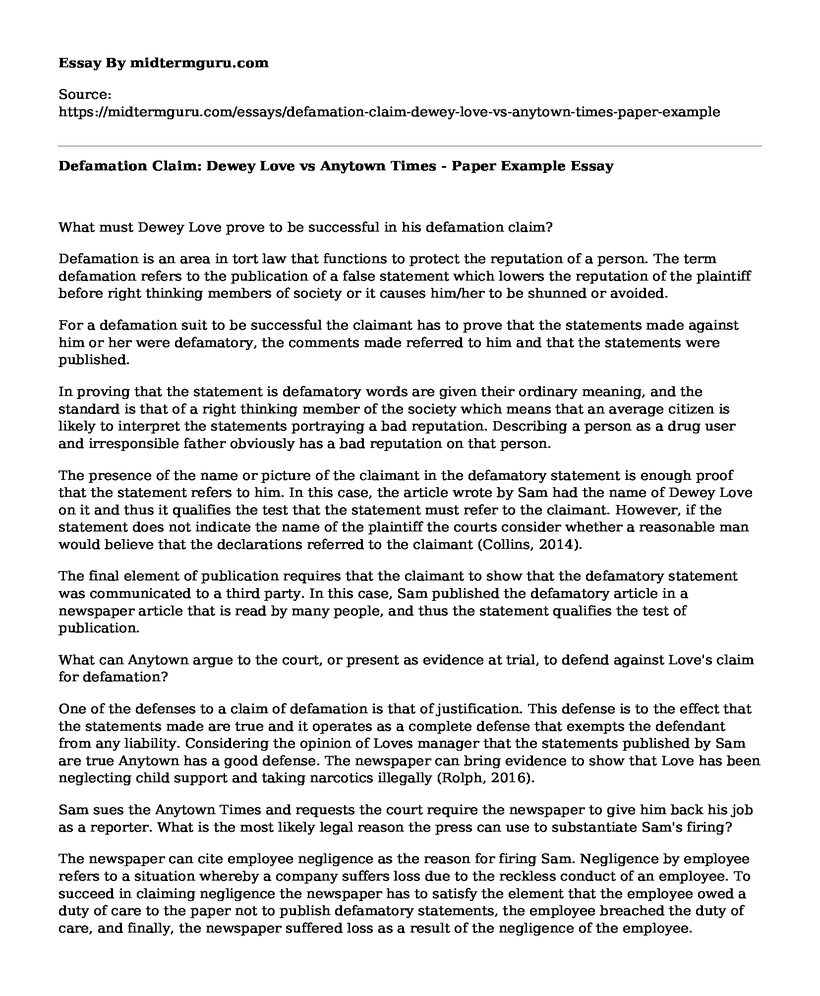What must Dewey Love prove to be successful in his defamation claim?
Defamation is an area in tort law that functions to protect the reputation of a person. The term defamation refers to the publication of a false statement which lowers the reputation of the plaintiff before right thinking members of society or it causes him/her to be shunned or avoided.
For a defamation suit to be successful the claimant has to prove that the statements made against him or her were defamatory, the comments made referred to him and that the statements were published.
In proving that the statement is defamatory words are given their ordinary meaning, and the standard is that of a right thinking member of the society which means that an average citizen is likely to interpret the statements portraying a bad reputation. Describing a person as a drug user and irresponsible father obviously has a bad reputation on that person.
The presence of the name or picture of the claimant in the defamatory statement is enough proof that the statement refers to him. In this case, the article wrote by Sam had the name of Dewey Love on it and thus it qualifies the test that the statement must refer to the claimant. However, if the statement does not indicate the name of the plaintiff the courts consider whether a reasonable man would believe that the declarations referred to the claimant (Collins, 2014).
The final element of publication requires that the claimant to show that the defamatory statement was communicated to a third party. In this case, Sam published the defamatory article in a newspaper article that is read by many people, and thus the statement qualifies the test of publication.
What can Anytown argue to the court, or present as evidence at trial, to defend against Love's claim for defamation?
One of the defenses to a claim of defamation is that of justification. This defense is to the effect that the statements made are true and it operates as a complete defense that exempts the defendant from any liability. Considering the opinion of Loves manager that the statements published by Sam are true Anytown has a good defense. The newspaper can bring evidence to show that Love has been neglecting child support and taking narcotics illegally (Rolph, 2016).
Sam sues the Anytown Times and requests the court require the newspaper to give him back his job as a reporter. What is the most likely legal reason the press can use to substantiate Sam's firing?
The newspaper can cite employee negligence as the reason for firing Sam. Negligence by employee refers to a situation whereby a company suffers loss due to the reckless conduct of an employee. To succeed in claiming negligence the newspaper has to satisfy the element that the employee owed a duty of care to the paper not to publish defamatory statements, the employee breached the duty of care, and finally, the newspaper suffered loss as a result of the negligence of the employee.
It is unanimous that ethical journalism requires journalists not to publish defamatory statements and to this effect journalists have a duty of care to their employers not to publish defamatory statements. Information released should be verifiable, which is a critical issue that Sam totally disregarded after he did a research and found that Lisa does not work for Dewey Love. To the effect that Sam published information that he believed not to be true (the fact that he admitted to, on the internet), he is deemed to have breached the duty of care owed by him to his employer not to publish defamatory statements. Finally, it is important to show that the newspaper has suffered a loss which in this case is in the form of a law suit in which it is accused of defamation. Lawsuits are expensive to defend and even more expensive when one has to pay damages (Orange, 2013).
References
Collins, M..Collins on defamation. (2014) Oxford University Press, 214.
Orange, R. 14 Legal affairs journalism. (2013). Specialist Journalism, 160.
Rolph, D. Reputation, Celebrity, and defamation law. (2016) Routledge, 148.
Cite this page
Defamation Claim: Dewey Love vs Anytown Times - Paper Example. (2021, Jun 02). Retrieved from https://midtermguru.com/essays/defamation-claim-dewey-love-vs-anytown-times-paper-example
If you are the original author of this essay and no longer wish to have it published on the midtermguru.com website, please click below to request its removal:
- Essay Sample on Juvenile Delinquency Prevention
- Why There Is a Need for Police Reforms? - Essay Sample
- DeCavalcante Crime Family - Research Paper
- What Does UNODC Do to Assist the Member States To Come Up With a Robust Criminal Justice System?
- Dallas DA Takes Positive Step: Dismissing First-Time Marijuana Cases - Essay Sample
- Plato Justices - Essay Sample
- Martin Luther King Jr.'s Letter From Birmingham Jail: A Powerful Voice for Civil Rights - Essay Sample







